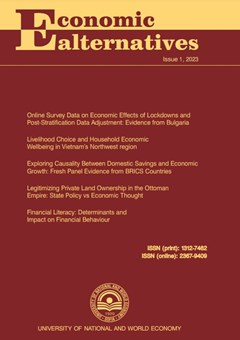Financial Literacy: Determinants and Impact on Financial Behaviour
Author: Krasimir Marinov Marinov
Abstract
The knowledge and skills required for personal finance management are becoming more important due to a number of trends. At the same time, research of student’s financial literacy either completely lacks or shows that financial knowledge and skills are insufficient. The present first-of-its-kind study in Bulgaria addresses this discrepancy. The purpose of the article is to present the results from an empirical study on the financial literacy of students at Bulgarian universities. From a methodological perspective the article is based on a quantitative empirical research. The research has found that the level of financial literacy is influenced by characteristics such as gender, student income, and responsibility for the financial decision-making, but does not depend on student specialty, university, educational degree or taking a course in personal finance management. If the impact of financial literacy on students’ financial decisions and behaviour is concerned, the results show that the knowledge and skills required for personal finance management influence how one controls the budget in a household, the behaviour in cases of decreased income, and retirement savings. However, financial literacy does not influence the availability of a household budget, the frequency of budget control and the availability of an emergency fund.

